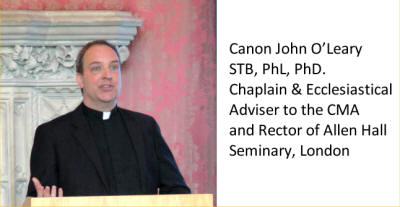Catholic Medical Quarterly Volume 73(3) August 2023
A Critique of the Terms of Reference of the Parliamentary Health and Social Care Committee Assisted Suicide Inquiry January 2023
 While
the consultation of Assisted Suicide was being carreid out by the
Parliamentary Health and Social Care Committee in Januay 2023, Canon John
reminded us that the way questions are written, and the way Terms of
Reference are set out, can predicate the answers to questions. We publish
this article as it shows elegantly how that was done in the Parliamentary
inquiry
While
the consultation of Assisted Suicide was being carreid out by the
Parliamentary Health and Social Care Committee in Januay 2023, Canon John
reminded us that the way questions are written, and the way Terms of
Reference are set out, can predicate the answers to questions. We publish
this article as it shows elegantly how that was done in the Parliamentary
inquiry
A number of questions in the Terms of Reference appear to lean towards an assumption that the Inquiry will result in permitting assisted suicide
These questions do not seem to consider whether there is an intrinsic moral objection to helping someone take their own life. Rather the questions suggest that the real moral issue is ensuring that there are safeguards and that individual autonomy is respected. I think it would be important that any response points out the short comings of such questions in the Terms of Reference. Responses also need to make clear that the argument that is never right directly to intend to help someone commit suicide needs, at least, to be considered. Unless we state this, it may be assumed that in answering the questions we have no difficulty in principle with assisted suicide.
I would also highlight that the terms “assisted dying” and “assisted suicide” are not equivalent terms. This is not nit-picking, but is at the very heart of the moral argument. Helping someone to die is not the same as helping someone to kill themselves. Good palliative care can achieve the former without ever directly intending to kill someone or to help them kill themselves. Also, this abuse of terms, calling “assisted suicide” “assisted dying”, makes it sound much less objectionable than it really is.
I include some comments beneath the questions that I find problematic.
Q. To what extent do people in England and Wales have access to good palliative care? How can palliative care be improved, and would such improvements negate some of the arguments for assisted dying/assisted suicide?
This second question could suggest assisted suicide is the default position for which arguments against it being so need to be presented, rather than assisted suicide requiring justification (for which, of course, we hold there is none).
Q. What can be learnt from the evidence in countries where assisted dying/assisted suicide is legal?
That it should not be legal!
Q. What, if any, are the physical and mental health criteria which would make an individual eligible to access assisted dying/assisted suicide services?
There are none.
Q. What are the professional and ethical considerations involved in allowing physicians to assist someone to end their life?
The question would be better phrased; “What would be the professional and ethical considerations involved in considering if it was permissible to allow physicians to assist someone to end their life?
Q. What protections could be put in place to protect people from coercion and how effective would these be?
This question could be read as implying that there is no moral objection to assisted suicide in itself. The moral issue presented is only that of preventing coercion. Whilst there is a real risk that permitting assisted suicide could lead to people being coerced into seeking assistance to commit suicide (and, indeed, into giving such assistance), it is important that any response to this question points out that, irrespective of whether or not there is coercion, at the very least the question as to whether it is ever morally permissible to help someone take their own life needs be asked by the inquiry.
Q. What information, advice and guidance would people need in order to be able to make an informed decision about whether to access assisted dying/assisted suicide services?
Once more, this question seems to presume that there is nothing intrinsically wrong with assisted suicide. A direct answer to this question could give the inquiry cause to believe one agrees with assisted suicide, so long as people can make an ‘informed decision’. I suppose one might say ‘whether’ allows for advice etc to help one make an informed decision, NOT to access the services. However, as I read it, the slant of the question is towards what information etc is required to make the decision to access the services morally justifiable, rather than giving scope for the argument that no amount of information etc can ever make the decision to access help to take one’s life morally licit.
Q. What capabilities would a person need to be able to consent to assisted dying/assisted suicide?
Yet again, the presumption appears to be that there is no intrinsic moral objection to assisted suicide. The moral issue raised here is only one of consent and the capacity to give it. In addressing this question, it is essential to make clear that at the very least the question must be considered by the Inquiry as to whether or not it is ever objectively right to take one’s own life and/or seek assistance from others to do so, even when consent with full knowledge is freely given
